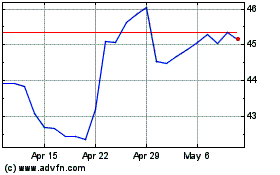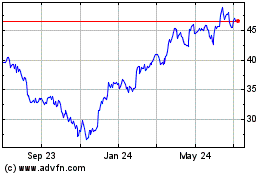Tesla Motors Inc. plans to press Obama administration officials
to talk to Xi Jingping about making it easier for auto makers to do
business in China during the Chinese president's visit to the U.S.
next month.
The issue has gained urgency for Tesla as several new
electric-car startups in the U.S. have emerged with Chinese
financial backing. China prohibits foreign car makers from
assembling vehicles in that market without a Chinese partner, which
can make it much more difficult to operate there.
All the big global car companies, including General Motors Co.
and Ford Motor Co., produce vehicles in China, mostly through joint
ventures. Chinese car makers have yet to attempt to assemble
vehicles with their brands in the U.S., but Tesla is concerned that
they have a much easier road to travel. "The China-owned companies
are not expected to sell controlling stakes to American companies
and are free from other trade hurdles that we face," Tesla
spokesman Ricardo Reyes said.
"The requirement that Tesla establish a joint venture for local
manufacturing and other obstacles to our activities, such as much
higher import duties in China compared to the United States, put
American car companies at a significant disadvantage," he said.
The White House didn't immediately offer comment.
China is pushing hard for greater electric-vehicle use, and most
major cities offer exemptions from high fees and a lottery system
that buyers of gasoline-fueled vehicles must endure. Still, Tesla
struggled last year in its launch of sales in China, and the recent
devaluation of the yuan to the dollar makes it even more difficult
to make money importing vehicles from its plant in California.
Meanwhile, new U.S.-based electric-car companies—some with
Chinese backing—are expected to develop vehicles for sale in the
U.S. and China. They include Faraday Future Inc., Atieva Inc. and
Fisker Automotive Inc., as well as Chinese tech firm Leshi Internet
& Technology Co. With significant funding but little publicity,
they are hiring dozens of engineers from a list of established auto
makers that includes Tesla.
Tesla also faces looming competition from some high-profile
names, like Audi AG, which is developing an electric sport-utility
vehicle, and Apple Inc., which is working on an electric car.
The electric-vehicle market remains tepid, with only a few
players selling battery-powered cars in significant volumes despite
big improvements in capability and hefty government incentives
aimed at juicing EV sales. In recent years, several companies have
either fizzled or failed to gain traction, including Los
Angeles-based Coda Automotive Inc., Norway's Think Global A/S,
Canada's Feel Good Cars Inc., and Aptera Motors
Tesla's early success in the electric-vehicle market has been
unique. The Palo Alto, Calif.-based company founded by Elon Musk is
on track to sell at least 50,000 vehicles in 2015 and plans to
launch a sport utility in September and a cheaper model in 2017.
While mired in red ink, its model sets the template for smaller
ventures, including those with Chinese backing.
Fisker Automotive, which is based in Southern California, has
revived its hopes after China's Wanxiang Group Corp. bought the
failed hybrid-electric supercar maker out of bankruptcy in 2014.
The company has secured a manufacturing facility in Southern
California and is planning to re-launch the brand in coming
years.
Beijing-based Leshi Internet & Technology, or LeTV, has
hired more than 100 engineers in the U.S. from Tesla, Ford and
others to build an electric vehicle. Earlier this month, the
company unveiled plans for an electric sports car called Le
Supercar, slated for sale in China, the U.S. and other markets. The
company says it has teams in the U.S. and China working on the
car.
Faraday Future, which was started in 2014, has drawn from
Tesla's example. Like Tesla, which bears the name of inventor Nikol
Tesla, the California-based company is named after scientist
Michael Faraday. In addition, Nick Sampson, Faraday's "product
architect," was an engineer instrumental in Tesla's development of
the Model S.
Mr. Sampson said the company, which aims to sell a car by 2017
carrying a battery bigger than the one powering the Model S, has
"very ambitious" goals. "Because of [our] ability, capability and,
yes, funding, we are confident we can deliver," Mr. Sampson said in
an email.
Tesla officials say they believe LeTV has provided funding for
Faraday, though an LeTV spokesman called the suggestion
"speculation."
Mr. Sampson declined to specifically comment on a LeTV
connection. "While currently California-based, and with definitive
future plans to be an American company in all aspects of R&D
manufacturing and administration, [Faraday] is nonetheless a global
company with a very diverse funding strategy, working directly with
organizations not just in the U.S., but Asia and Europe as well,"
he wrote.
The company said it now has 300 employees.
A Faraday spokesman said the company is hunting for a
manufacturing site in Nevada, Louisiana, Georgia or California and
aims to secure suppliers for its vehicle. The company has reached
out to auto-supply powerhouses like Michigan-based Delphi
Automotive PLC, and to Silicon Valley's Nvidia Corp., whose
offerings include computing technology for the auto industry.
LeTV and Beijing Automobile Industry Co. announced last year
that they had jointly invested in Atieva. The company, which is
based in Menlo Park, Calif., has been quiet on its business plan;
its single-page website says the company is creating "a
breakthrough electric car in the heart of Silicon Valley." The site
advertises nearly 100 job openings, up sharply in the past few
weeks.
Atieva has nearly a dozen former Tesla engineers and other
professionals on staff, based on public profiles posted on
LinkedIn. Chief Executive Bernard Tse is a former board member and
vice president at Tesla. He declined to comment.
Write to Mike Ramsey at michael.ramsey@wsj.com
Subscribe to WSJ: http://online.wsj.com?mod=djnwires
(END) Dow Jones Newswires
August 28, 2015 17:05 ET (21:05 GMT)
Copyright (c) 2015 Dow Jones & Company, Inc.
General Motors (NYSE:GM)
Historical Stock Chart
From Mar 2024 to Apr 2024

General Motors (NYSE:GM)
Historical Stock Chart
From Apr 2023 to Apr 2024
